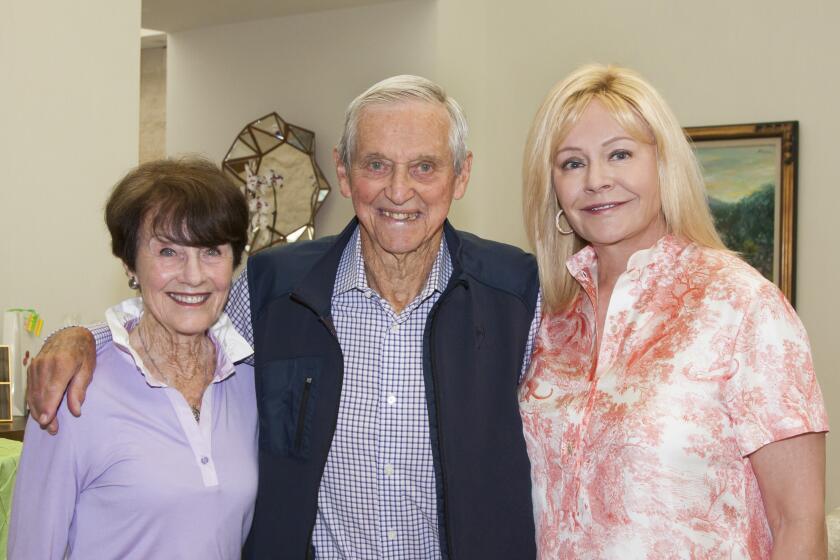In The Pipeline: No simple way to help the homeless
Beach and Edinger. Warner and Gothard. Heil and Bolsa Chica. At more and more intersections, I notice them, growing in numbers. Do you?
They are the forgotten and the fringe. The homeless and the hustlers. Some beg for money. Some just wander aimlessly. Others argue aloud, conducting jagged, stilted conversations with demons unknown.
You cannot categorize them all into one convenient group. Most seem harmless, haunted and genuinely needy. But then recently a homeless man was arrested on suspicion of having unlawful sex with a minor behind the Main Street Library Branch. And I’ve seen them lurking in encampments in Central Park and throughout the wetlands. It is bad and it seems to be getting worse.
But what do we do?
Where do we even start?
Recently someone showed me a Google Earth photo of a spot along Adams Avenue. In the photo, a person was sleeping on the concrete. It reminded me of Dorothea Lange’s stark photos of the forlorn during the Great Depression. Only instead of being captured on black and white film, this poor soul had been digitized in color, his situation frozen forever on the Internet.
Somebody mentioned that they saw a body there the day before, in the very same spot. It was stunning (and hard to believe) that the same person might still be there months after this photo was presumably taken.
The next morning I drove over, armed with some bananas and fresh bottles of water. When I walked over I found a husky black man sitting by himself on an old soiled blue backpack, in the exact spot where the photo was taken. It was warm but he had on odd layers of black, tattered sweaters and shirts. I don’t know if it was him in the picture, but it doubt it. The spot was well protected from view so it may be a regular crash site for those living on the streets. It is adjacent to the Talbert Channel, and so about 10 snowy egrets were nearby the water’s edge.
He looked to be in his early 40s or so and was startled when I approached. He nervously asked what I wanted and I explained calmly that I didn’t want anything except to see if I might give him some food and water.
He remained suspicious of me and I told him that I would simply leave the goods and walk away. Then he asked why I brought them and I said that I’d heard somebody was there and that I just wanted see if I could help. He seemed OK with that. The man relaxed and told me his name was “Dennis.” I introduced myself and told him I was a writer and asked if I might mention him in my story. He said it was fine. I asked to sit down and he motioned that it was OK. So I sat and we talked for awhile in the warm morning sun.
He told me he was from Los Angeles and that he been living on the street for a “few years,” surviving on “this and that.” We spoke a little bit more about how he got through each day and I could tell he didn’t want to offer too much detail. He did not seem crazy. Private? Yes. Tired, ragged and lonely? Absolutely.
Soon, he thanked me warmly, I wished him well and moved on.
The next morning I drove over again and Dennis was still there. So I left him something else to eat and some more fresh water. I asked if he wanted me to get in contact with anybody for him. He said no, his family knew how he lived, and he was fine and preferred to be left alone.
I contacted Capt. Dave Panetta from the Huntington Beach Police Department to ask about people like Dennis — are there services for him, I wondered? He told me not really, but that there were churches and other outreach organizations that help as much as they can. He also told me they have to be treated like any other citizen.
There are no special rules or regulations for those deemed as “the homeless.” If there are complaints about something, an enforcement team goes in to check it out. If they find encampments at places like Central Park, they clean it up. He said they use a “common sense approach” to balance all community sensitivities and that it’s a “sign of the times” how bad things are getting and that more and more people seem to be choosing a lifestyle of homelessness or begging.
“You can’t make the same judgments about all of them,” he said, and I agree. Everyone is unique, no matter what.
That’s what’s so frustrating about much of this. There are so many different kinds of people out there on the street. There are the hustlers who fill cans of money each day at freeway exit ramps and then simply go home. There are the truly disenfranchised that have nothing to live on and nowhere to live.
(Somebody I wrote about in this column several years ago, a very skilled man, now lives out of his car in Huntington Beach.) Then there those that may be clinically insane — helpless, hopeless victims of systematic neglect and/or abuse (with no family of friends to care for them).
We have politicians today at the highest levels, on both sides, telling us that the economy is “improving, but not fast enough.” They tell us the unemployment rate is going down as proof of this “recovery.” Yet they never seem to factor in those that have “stopped looking for work.”
Those people are the key, I think. The one’s that give up. The ones that give in to the system that does not even bother to include them in the equation. Those, to me anyway, seem to be the most likely candidates to wind up as one of these tortured figures hunkered down in the shadows. Not the hustlers, not the mentally challenged — but those that have just given up because of how bad things are.
So what to do? I don’t know. But I do think as a society we need to get out of our collective bubbles and deal with the issues many of these newly-arriving transplants are dealing with, at least the mentally challenged and those that have given up.
This is not going away on its own. And our elected leaders don’t seem to want to address things, perhaps because it would mean confronting something that is not easily fixed with a sound bite. It’s something that would require getting dirty.
But you can only avert your gaze for so long. Soon, everyone will have to deal with this.
By the way, there is actually one thing I have learned in the meantime: It’s always a good idea to keep some fresh water and a little food in your car. I mean, you never know when you might run into somebody that can really use it, like Dennis.
CHRIS EPTING is the author of 19 books, including the new “Baseball in Orange County,” from Arcadia Publishing. You can chat with him on Twitter @chrisepting or follow his column at https://www.facebook.com/hbindependent.
All the latest on Orange County from Orange County.
Get our free TimesOC newsletter.
You may occasionally receive promotional content from the Daily Pilot.



